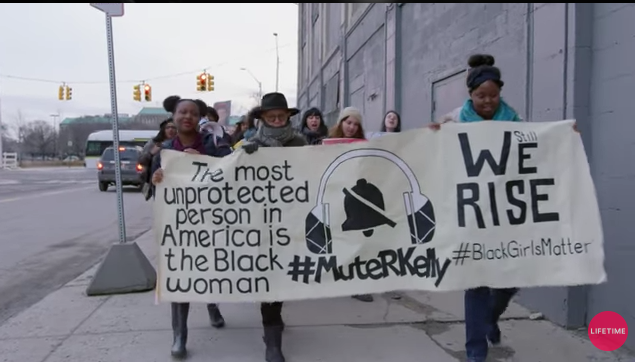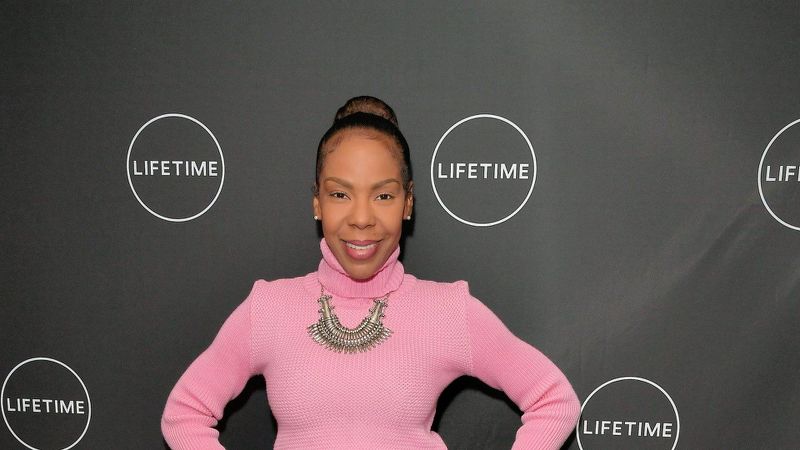
Like millions of other people in this nation, I was riveted by the six-part documentary series, Surviving R. Kelly. It forces us, particularly as Black women, to examine our own lives, and to come to terms with how we promulgate misogyny.
Here’s a little vignette from my college years: I was a sophomore at Tufts University, living in the African-American residence known as Capen House. I was disturbed that one of the Black upperclassmen had written a diatribe against Black women on the wall outside his room, a common area. So disturbed that I broke my silent watchfulness to confront this damaged boy-man. He was in his room, doing pull-ups on a bar he had installed in the doorjamb, when I approached him.
“Why have you written this?” I asked him, pointing to the vitriol brandished permanently in his residence, my residence, my voice faltering as I observed his hulking frame going up and down with each pull-up. “Because y’all deserve it,” he snarled, launching into a list of Black women’s faults: too ambitious, too bossy, too aggressive, too nagging, too ugly—all of this reeled off without making eye contact with me—a non-human to him.
I slunk away from this scene, knowing instinctively that I had no support—not from the administrators who worked on the floor below our residence. Not from our house parent. Not from the other women— residents or visitors to Capen House—who had seen this poisonous passage and done nothing.
Case closed. At least for a while. Until the damaged boy-man got his Asian girlfriend pregnant during his final year in school and needed money for an abortion. He returned to Capen House from his new home off campus to raise money from the very women he had eviscerated. I know this because he had solicited a good friend of mine, who relayed the news to me. “You didn’t give him anything?” I asked, shooting her a panicked look, willing her to a solidarity that we as Black women should have. My shoulders sagged and my friend shrugged and smiled sheepishly.
A scholarship student from a working-class background, my friend had scrounged up dollars she sorely needed for herself to help the damaged boy-man address his crisis. A Black woman using her scant resources to help a damaged Black boy-man who hated her and everyone like her for reasons no one can discern, who essentially hated himself. How many times have we seen this scenario of one-way loyalty played out? In our circles of friends? In our families? In our workplaces?
Each time a Black girl is forced to kiss a relative or friend she doesn’t like, she loses agency. Each time a Black girl is told to pray for a despicable person, she loses agency. Each time a Black woman is expected to bail someone out of jail who should stay there, she loses agency. Each time a Black woman is encouraged to look past infidelity, or physical or emotional abuse, she loses agency. Each time a Black woman is asked to put aside her dreams for those of someone else she loses agency.
We as Black women are the champions of subjugating our needs, our desires, and even our dignity. It is what is expected of us, and we have come to expect it of ourselves. The R. Kellys of the world capitalize on the behavior we have already incorporated into our lives, taking it to the next level, weaponizing it against us.
Minus the high-level sexual deviancy, the R. Kelly story highlights several other themes that are closer to what we often experience or see in the communities around us: Unsupervised, willful children, adults who are so desperate to be close to fame they will cavort with the devil to have a celebrity child, women who will put up with all manner of degradation to be part of a couple.
We should never blame the victim, but I can’t help but ask why a mother would buy tickets to a concert featuring a rumored pedophile for her husband’s birthday present, or why she and her husband felt their daughter would escape the inevitable predator’s snare with another of their girl children in the role of a chaperone, she too, at risk.

You can’t help but wonder why grown women with careers (perhaps chosen as beards) did not balk when they were ordered to move in with the performer and give up their lives. You can’t help but wonder why a professional musician would introduce her niece and other members of her family to this pedophile. You can’t help but wonder if, when Chance the Rapper, a former musical collaborator of R. Kelly’s, says that he didn’t take the allegations against Kelly seriously because the victims were Black girls, is he saying this to spark honest conversation or is it because he knows that in the context of Black misogyny there are no consequences for a such revelation?
A few days ago on Facebook, a friend of mine posted the hashtag #MuteRKelly. A friend of hers popped up on my feed, asking if we need to mute a long list of other performers, including Steven Tyler and James Brown. Breaking protocol, I replied directly to this woman, someone I don’t know: “Mute them all. And if there’s no one left then make your own music!” What we need to mute is our low self-esteem and our need to deflect our issues instead of solving them.
I don’t want to talk about R. Kelly anymore. I don’t want to know every depravity that went on in his sex-cult houses of horror. I don’t want to know what additional freaky door is opened by his turning a young girl into a boy, as he did with a young girl called Dominique. I do hope that he goes to jail for the rest of his life, along with the managers, lawyers, law-enforcement officials, bodyguards and musicians who have been his enablers.
R. Kelly picked up teenagers outside the courtroom where he was once on trial, evidence of a mind-blowing arrogance. An arrogance built on the conceit, the confidence, that he would get away with it. Because we have let him. His minions, including an uncle of one of the victims, collect paychecks off this same confidence. Black girls. Black women. Who cares? Not even other Black women. Until now. We must examine all the chinks in our armor that have allowed this for so long. It is a much bigger conversation than the appetites of a freak.
Misogyny is part of the larger American landscape, no doubt. The nation elected a dangerous buffoon over a seasoned public servant for the presidency in part because citizens, both male and female, couldn’t envision being led by a woman. The Trump supporter who was photographed wearing the tee shirt with the words, “He can grab my p___y anytime” is not alone in this sentiment.
As the #Metoo movement blossomed, a jurist with an alleged history of sexual assault became a member of the Supreme Court of the United States. While we condescend to women wearing burqas overseas, many women across the board here struggle with self-worth, and are more likely to pick off each other than to address the male power structure. And, as we know, pedophilia is part of the national DNA—from slavery to the present. That’s another post.
But what I am attempting to address here is that the Black community has a problem with misogyny that is separate and distinct from other communities, based on our own unique, painful history and warped aspects of our culture. We must face this fact bravely. Small subjugations lead to big subjugations. Black women have become used to eating s__t, to making excuses, to having the backs of people who don’t have theirs, like my friend in Capen House so many years ago. Like so many of us in so many different ways every day. Including me.
This must end. And it starts with us. It is not enough to survive R. Kelly. We must survive ourselves.
_____________________________________________________________________________________
Congrats to cultural critic and filmmaker dream hampton for producing this docuseries. It runs again in its entirety tonight, January 11, on Lifetime for those who haven’t seen it.

You must be logged in to post a comment.